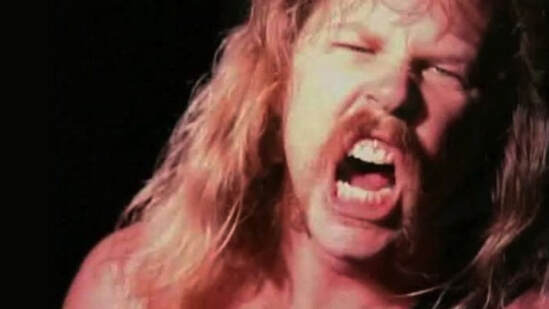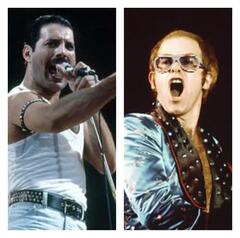
by Julian Spivey
June is LGBTQ Pride Month. The month was chosen to commemorate the Stonewall riots in New York City at the end of June 1969 and the impact that event had on the LGBTQ community. The month has since become a time to celebrate the LGBTQ community and all its glories – including the fantastic artistic contribution to the world of music. The world of music has been bettered by so many LGBTQ artists, 12 of which are celebrated here for their contributions – basically 12 of my favorites, if you will. Some of these artists have been around for many decades, some are newer. Some are household names and others should be. Many different genres are featured from rock to pop to country and I believe this proves just how important LGBTQ artists have been for music as a whole. Billie Joe Armstrong (Green Day)
Billie Joe Armstrong has been the leader of the most popular punk rock/pop punk band of the last 25 years in Green Day. The Rock & Roll Hall of Fame inductees have won numerous awards over their career, including five Grammys, and has played a major role in getting punk sounds into the mainstream. Armstrong is one of the more popular members of the LGBTQ community in the music community, but I’m not sure how many people realize he identifies as bisexual. Armstrong first identified himself as bisexual in 1995 in an interview with The Advocate saying, “I think I’ve always been bisexual. I mean, it’s something that I’ve always been interested in. I think people are born bisexual, and it’s just that our parents and society kind of veer us off into this feeling of, ‘Oh, I can’t.’ They say it’s taboo. It’s ingrained in our heads that it’s bad, when it’s not bad at all. It’s a very beautiful thing.” Armstrong told Rolling Stone in 2014 that Green Day’s album Dookie, released in 1994, touched on his bisexuality a lot.
Brandi Carlile
It’s great to see that Brandi Carlile is becoming more and more of a household name after the acclaim of her most recent album By the Way, I Forgive You, released last year. The album was nominated for six Grammy Awards, including the biggest of the year – Album of the Year – and won three trophies. Carlile identified herself as a lesbian in a 2002 interview with the Los Angeles Times saying, “I don’t have to have a lot of formality around it … there were people before me who paved the way.” She’s married her wife Catherine Shepherd in 2012 and they have two daughters together. Her recently Grammy-nominated song “The Joke” is about people feeling misrepresented she told NPR, “So many people feeling unloved. Boys feeling marginalized and forced into these kind of awkward shapes of masculinity that they do or don’t belong in … so many men and boys are trans or disabled or shy … the song is just for people that feel under-represented, unloved or illegal.”
Tracy Chapman
Tracy Chapman burst upon the popular music scene in 1988 with her self-titled debut album that featured the top-10 hit “Fast Car,” that would be nominated for Song of the Year and Record of the Year at the Grammy Awards. Chapman has won four Grammys in her career, including Best New Artist when she broke out. Chapman has never publicly disclosed her sexual orientation but was in relationship in the ‘90s with The Color Purple author Alice Walker. She often helps out the LGBTQ community by performing at charity events for AIDS awareness.
Brandy Clark
Brandy Clark has been one of Nashville’s best songwriters for years penning tracks for big time artists like Miranda Lambert, Reba McEntire and Kenny Rogers, but she’s also one of country music’s most underrated singer-songwriters, in general. Clark should be a huge star, but the type of country music she writes and records (*read real country music*) isn’t what hits the radio airwaves these days. She is critically loved having been nominated in 2015 for Best New Artist at the Grammy Awards despite no radio airplay. Her two albums 12 Stories and Big Day in a Small Town are among the best country has to offer of the past decade and fans are eagerly awaited a third release. Clark is openly gay, but says her sexuality has no bearing on her work. She told The Washington Post in 2014, “I don’t write songs for straight people or gay people or black people or white people. I write songs for people. I want them to put themselves in these songs. I would feel that way if I was straight.”
Melissa Etheridge
Like Tracy Chapman, roots rocker Melissa Etheridge broke out big time in 1988 with her self-titled debut album that earned her a Grammy Award nomination for her track “Bring Me Some Water.” Her 1993 album Yes I Am, which has generally been assumed to be confirmation of coming out, was a huge success featuring the jams “Come to My Window” and “I’m the Only One,” both of which were nominated for Best Rock Song at the Grammys. Among the most important lyrics of “Come to My Window” are: “I don’t care what they think/I don’t care what they say/What do they know about this love, anyway?”
Mary Gauthier
Mary Gauthier has been one of folk music’s most acclaimed singer-songwriters for many years and has even had some songs cut by famous country music stars like Tim McGraw and Blake Shelton. Gauthier is a multiple time Grammy Award nominee, including a nomination this year in the Best Folk Album category for her latest release Rifles and Rosary Beads, which she co-wrote with actual military members to tell their stories. Gauthier is a multiple time Gay and Lesbian American Music Award nominee.
Alynda Segarra (Hurray for the Riff Raff)
Hurray for the Riff Raff has been one of the most acclaimed groups in the Americana genre over the last decade and are led by Bronx-bred, of Puerto Rican descent frontwoman Alynda Segarra, who identifies as queer. Her group’s most recent album The Navigator, from 2017, was Segarra harkening back to her roots as a Puerto Rican growing up in the Bronx and saw both her and the group bring activism more into their music. In an interview earlier this year with DNO when asked about her activism she said: “I enjoy bringing people together. I have organized two events called Nosotros. A gathering of latinx artists, musicians and poets, an event where we can embrace who we are as latinx queers, activists and weirdos. In a country that has become more violent towards latinx people and culture, I believe celebrating together is a radical act of joy.”
Elton John
There is perhaps no bigger and more acclaimed LGBTQ musician than Elton John, who has been recording fantastic music for half a century now and over the last 25-plus years has done a lot to help fight AIDS with his Elton John AIDS Foundation, which has raised over $200 million for prevention, education and direct care to people living with HIV. Elton John first addressed his sexuality in 1976 when he came out as bisexual in a Rolling Stone interview. In 1992 he would tell the same magazine “I’m quite comfortable being gay.” He married his husband David Furnish in 2014 after being together for more than 20 years. The couple have two sons together.
Freddie Mercury (Queen)
Freddie Mercury is regularly regarded as one of the greatest vocalists in the history of rock music as the frontman of the hugely popular British band Queen and has been heralded as one of the most important LGBTQ performers of all-time. Mercury’s flamboyant performance style would have some journalists alluding to his sexuality and even asking him about it, but it wasn’t something Mercury ever put forth verbally in public, though many believed him to be out when in public life. Mercury was the first big music star to die as a result of AIDS in 1991 at the age of 45. In 1993 after Mercury’s death Gay Times writer John Marshall wrote: “Mercury was a “scene-queen,” not afraid to analyse or justify his ‘lifestyle.’ It was as if Freddie Mercury was saying to the world, ‘I am what I am. So what?’”
George Michael
George Michael was one of pop music’s biggest representatives of the LGBTQ community. He rose to fame in the early ‘80s as a member of the pop duo Wham! before embarking later in the decade as a very successful solo artists that would see him sell over 115 million records worldwide, chart eight Billboard No. 1 hits and win two Grammy Awards, including Album of the Year for Faith in 1989. Michael came out as gay in 1998 and was an active LGBTQ rights activist and AIDS charity fundraiser. One of his career highlights was a duet with fellow LGBTQ star Elton John in 1991 on Elton’s “Don’t Let the Sun Go Down on Me.” Michael died at age 53 in 2016.
Sarah Shook
Sarah Shook with her backing band the Disarmers has been one of the best up-and-coming groups in the Americana and alt-country genres over the last few years with a couple of stellar releases in Sidelong (2015) and Years (2018) to begin her career. She is a complete badass who’s taken a punk attitude and combined it with honky-tonk music to form a special kind of sound. Shook identifies as bisexual and received the 2016 Indy Arts Award with collaborator Erika Libero for their work in promoting inclusion for women and LBGTQ in her hometown of Chapel Hill, N.C. with a Safe Space initiative, according to She Shreds Magazine. In a 2016 interview with Rolling Stone Shook said: “This genre of music attracts a certain kind of person sometimes who is very close-minded, and I want to tell those people, ‘Look, you’re welcome to be a fan. But full disclosure, I’m a fucking civil rights activist, and I’m a bisexual, and I’m an atheist, and I’m a vegan,’ you know what I mean? That’s a whole lot of non-redneck shit right there.”
Michael Stipe (R.E.M.)
R.E.M. was one of the most important rock groups in the ‘80s because they took an alternative rock sound that was popular across colleges campuses in the country and exploded it into the mainstream. The group has had numerous Billboard Top 40 hits like “The One I Love,” “Stand,” “Losing My Religion” and “Everybody Hurts.” The Rock Hall inductees are led by frontman Michael Stipe, who has described himself as a queer artist in a TIME magazine article in 2001. When Stipe has been asked if he ever declares himself as gay he has said, “I don’t. I think there’s a line drawn between gay and queer, and for me, queer describes something that’s more inclusive in grey areas.”
0 Comments
by Preston Tolliver Metallica’s eponymous 1991 release commonly known as “The Black Album” has become arguably its most popular because it simultaneously marked the end of the band’s old sound and the beginning of a new one. “The Black Album” was a transitory album that bridged the decade of the band’s early raw and brutal albums and the more mainstream metal albums of the ‘90s. The album itself was the last agreed-upon great Metallica album, even, before a forgettable decade in the ‘90s and a straight disappointing one in the 2000s. No song was more recognizable off “The Black Album” than “Enter Sandman,” the opening anthem that taught metalheads the world over that eerie bedtime prayer. The song has become, by many, what the band is known for. However, through over-saturation on radio stations and in sports arenas, the song has overshadowed Metallica’s better works – works that cover, essentially, most every other song in their library to that point. It’s catchy, sure, but it shouldn’t define the band more than the preceding bangers it put out on the albums before: songs like “Master of Puppets,” “…And Justice for All” and their all-time best, “Fade to Black.” “Enter Sandman” is certainly Metallica’s most overrated song, and I dare say the worst song overall of the band’s first era (1983-1991). 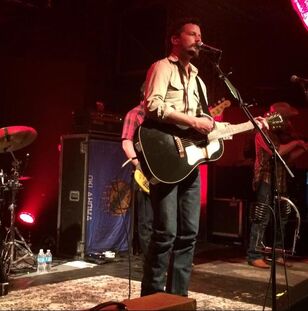 by Aprille Hanson “The Bird Hunters” is my favorite Turnpike Troubadours song and on the surface it doesn’t make a whole lot of sense for me. It’s something that’s always puzzled my husband because obviously there are other songs in their repertoire like “Good Lord Lorrie” or his favorite, “7&7,” that could be considered pretty iconic hits of theirs. There are so many favorites to choose from in their discography, but there’s something about that song off their self-titled 2015 album that speaks to me. It’s funny because I have never hunted in my entire life, nor do I have any plans to try it. The only type of shooting I’ll be doing toward an animal is with a camera. But in reality the song has nothing to do about hunting, though that’s the setting. We see one friend trying to cheer the other friend up after a break-up. Even that is hardly relatable as I’ve been with my husband since high school. But that’s the masterfulness of songwriter/Troubadours’ front-man Evan Felker — he can tap into human nature using the simplest scenarios. Because while the song follows two friends duck hunting in the place the pair grew up, the lyrics point to how the main character is going through the motions while focused solely on his heart break and the ending of something he thought would last forever. In life I can’t even begin to count how many times I’ve gone through the motions of whatever task is ahead while letting my mind drift to something that is greatly impacting me. It’s something I assume most people do. From the loss of my mother to a recent scary but turned out to be false diagnosis for our beloved dog to randomly second guessing decisions seemingly mundane to the average person but to an over-thinker like me, filling my mind. I don’t think I’ve ever heard a song touch on the simplicities of living inside your head more than “The Bird Hunters.” I’m sure there are songs out there that fit the bill, but combined with Felker’s drawl and those easily overlooked observations that just come out so naturally in his writing, makes him one of the best. “The country was cold With the sun westward sinking It's good to be back in this place With my hands around A Belgian made Browning My mind on the lines of her face.” It’s clear that the character isn’t just thinking about the breakup, but her very being, every detail of her and reliving their breakup in the chorus: “She said go on back to Cherokee County Won't you crawl back with nothing but a razor and a comb Babe, if you need me, I'll be where you found me Go on to hell, honey, I'm headed home” I can vividly see the character half smiling to his friend, trying to cheer him up by explaining how he “dodged a bullet” by not winding up with her. It’s the universal need to try and make things right for people you care about, even if it’s offering up platitudes or clichés. It’s ironic because when the Turnpike Troubadours announced on May 31 that they were cancelling all their upcoming shows for an “indefinite hiatus,” explaining that they needed to take a break until “everyone is of strong mind, body and spirit and can deliver what our fans deserve” – essentially Felker for what we all presume is alcoholism — the first thing that popped in my head were his lyrics: “I was beginning To deal with it ending The old dog had pointed while part of me died And a flutter of feathers Then a shotgun to shoulder I thought of the Fourth of July She'll be home on the Fourth of July I bet we'll dance on the Fourth of July” That’s my favorite moment in “The Bird Hunters” because his crescendo and almost desperation on the lines “I thought of the Fourth of July. She’ll be home on the Fourth of July. Bet wed dance on the Fourth of July” was such a hopeful moment in such a sad scenario. The entire song we’ve watched this man distracted by his thoughts, fumbling through the task at hand, despite his friend’s best efforts, but the most focused he gets was when there’s a glimmer of hope that he can be reunited with this woman. The prospect of getting back what he desires most rejuvenates him. Following those lyrics, his friend points out: “Dan says, "Hell of a shot Looks like you've still got it That's what we came here to do” It immediately floods back into the chorus, recalling the couple’s fight. And I guess those “I was beginning” lyrics swirled in my brain because in reading the band’s statement and knowing for a while that this was probably coming, I just had this moment of thinking this may be the end to my favorite band, a band with song lyrics that deeply touched my soul. No matter the emotion, I can find a Turnpike Troubadours song to correlate with it. When people talk about soundtracks for their life, there are a handful of artists I can say would fit for me and this band is certainly at the top of the list. Not to mention the countless times my husband and I have stood on the front row in small venues like The Rev Room in downtown Little Rock, rocking out with a packed crowd behind us, singing along and dancing to every song they threw out at us. And when I say threw out, I mean “threw out” because they left it all on the stage every single time they performed. It was like they were setting their souls of fire and the crowd was ready and willing to catch the sparks. There are some people that are just meant to pour their heart out in music and watching Felker and the whole band perform live, I just can’t imagine that ending. It hurts to even consider it. And I do not want to pretend I understand at all the struggle that Felker or anyone else in the band is going through, because while I may know their music, as a fan, I just do not know their hearts. But whether I am as naïve or as hopeful as the character in “The Bird Hunters,” I’m continuing to think about the “Fourth of July” for the Turnpike Troubadours, whenever that may come, so we can all dance once again. 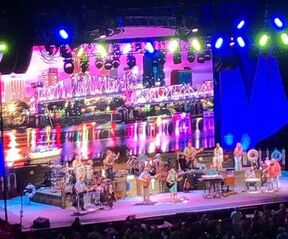 by Julian Spivey Despite the dreary, wet weather and nearby record flooding the mood inside Verizon Arena on Thursday night, June 6 was all sunshine, ocean waves and the fun of Margaritaville as Jimmy Buffett and his Coral Reefer Band bought the Son of a Son of a Sailor – High Tide tour to North Little Rock, Ark. for a night of his biggest hits. The performance was Buffett’s first in Arkansas since 2012, though he had another scheduled show since then canceled due to wintry weather. Parrotheads were ready to party and some had been doing so since 11 a.m. that morning tailgating near the venue despite the less than stellar weather. When Buffett began his show a few minutes after 8 p.m. he kicked things off with “License to Chill,” the title track off his 2004 collaborative album with a who’s who of country music superstars of that era. That album came hot off the trail of his 2003 collaboration with Alan Jackson, “It’s Five O’Clock Somewhere,” which was a no. 1 country hit (the first no. 1 song of Buffett’s career – his only other would also be a country collaboration of “Knee Deep” with Zac Brown Band in 2011). Buffett routinely performs “It’s Five O’Clock Somewhere” in concert with his right-hand man Mac McAnally, a terrific songwriter in his own right. Parrotheads everywhere likely know that Buffett has what’s know as “The Big 8” – eight songs that he performs at every show – and those were, of course, many of the highlights of his show at Verizon as the so-called “Songs You Know By Heart” of his discography. Seven of these songs have pretty much gone unchanged over the years and are: “A Pirate Looks at Forty,” “Changes in Latitudes, Changes in Attitudes,” “Cheeseburger in Paradise,” “Come Monday,” “Fins,” “Margaritaville” and “Volcano.” For many years “Why Don’t We Get Drunk” was a part of the standard ‘Big 8,’ but is only played occasionally by Buffett these days, he did grace the Little Rock crowd with this song’s appearance Thursday night to great applause. The song that often replaces it in the set is “One Particular Harbour,” also performed on Thursday. “The Big 8” truly has everything for the Parrotheads from what’s essentially Buffett’s theme song “Margaritaville,” which he performed as the final song in his regular set before his encore, to party novelty hits like “Cheeseburger in Paradise” and fantastically written ballads like “Come Monday,” my personal favorite of his work,” and “A Pirate Looks at Forty.” Personally, I’ve always been a bigger fan of Buffett’s ballads than his party songs, that sometimes are overdone in concert. Also, how is “Son of a Son of a Sailor” not considered one of his “Big” songs? Something Buffett has been doing on tour lately, that I don’t believe he was doing the last time I saw him live seven years ago, is stripping things down just a bit in a midsection part of his show where he gets back to his New Orleans roots a bit with a more jazzy feel where he regaled the audience with some stuff you might not often hear at a Buffett show like “Dreamsicle,” “Pencil Thin Mustache,” “Frenchman for the Night” and a newer Will Kimbrough penned song “Half Drunk,” which Buffett described as a “Why Don’t We Get Drunk Lite.” This is the type of thing I’d love to see Buffett do more in concert – in fact I’d like to see him do an entire tour of it. I think he could play his “Big 8” – party songs and all – and still do a show mostly of introspective ballads and rarities that he rarely, if ever, does live. I think true Parrotheads would not only be OK with this type of tour from Buffett but might actually love hearing some of those great songs from nearly perfect albums like A-1-A, Living and Dying in ¾ Time, Havana Daydreamin’ and Changes in Latitudes, Changes in Attitudes that aren’t often seen. A few performances I really enjoyed hearing on Thursday night that I wasn’t necessarily expecting were Buffett’s take on Rodney Crowell’s “Stars on the Water,” which he cut on his 1983 album One Particular Harbour, “Grapefruit – Juicy Fruit,” off 1973’s A White Sport Coat and a Pink Crustacean (one of the all-time great album titles) and “Last Mango in Paris,” off his 1985 album of the same name. Buffett also played his usual great cover of Crosby, Stills & Nash’s 1982 top-20 hit “Southern Cross.” After his uproarious performance of “Margaritaville,” and a lot of the audience dumbfoundedly filed out like it was the only song they came to see, Buffett returned to the stage with the supremely talented Coral Reefer Band, that includes longtime keyboardist and Blytheville, Ark. born and University of Arkansas graduate Michael Utley, for a great encore that included “We Are the People Our Parents Warned Us About,” “Love and Luck” and a cover of Bob Marley’s “One Love.” “One Love” has been the finisher at almost all of Buffett’s recent shows so I was incredibly surprised and completely appreciative when he stayed on stage after the rest of his band left and performed “Tin Cup Chalice,” off A-1-A (my favorite Buffett album), just him and his acoustic guitar. That’s my favorite Jimmy Buffett and it was a beautiful way to end a great night of music. 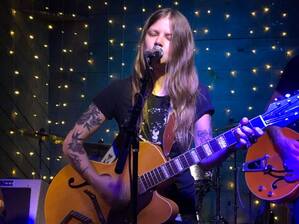 by Julian Spivey Sarah Shook & the Disarmers are one of the shining artists of modern alt-country and showed as much in their performance at The White Water Tavern in Little Rock, Ark. on Saturday, June 1. The group from Chapel Hill, N.C. has released two albums thus far – Sidelong, which was self-released in 2015 and re-released on Bloodshot Records in 2017, and last year’s Years. The group’s music is honky tonk meets punk, a terrific mixture for a small venue Saturday night show. No Depression put it accurately: “This ain’t no country for hipsters or posers. It’s real, raw, mean-and-evil-bad-and-nasty bidness that makes an ass-kickin’ sound mighty fine.” “Badass” is a word I’d use to describe Shook and her band and they were mighty badass on Saturday night at the Tavern. The band probably performed for about an hour-and-a-half on Saturday night, but it flew by quickly with them launching into song after song of raucous jams. The show was pretty evenly split between the group’s two albums with great selections off of Sidelong including the title track (which really shows off Shook’s unique voice), “Keep the Home Fires Burnin’,” “Heal Me” and “Nothin’ Feels Right But Doin’ Wrong.” Her performance of “Fuck Up,” from Sidelong, early on in her show pretty much served as a theme song for many of those in attendance at her show with its line: “God never mistakes he just makes fuck ups.” It’s pretty impressive how Shook has been able to overcome her sheltered upbringing in a fundamentalist Christian upbringing where secular music was not allowed to being such a free-spirited, badass performer who obviously gives zero fucks. Her critically-acclaimed album Years was one of the best albums in all of music last year and her show on Saturday night featured many of the album’s highlights like “Good As Gold,” “Damned If I Do, Damned If I Don’t,” “Lesson,” and “New Ways to Fail,” which she ended her fantastic set with. Earlier I mentioned that Shook has a unique voice, which is something hard to find in music these days, you can feel every bit of emotion in her quivering voice in these songs showing she’s truly felt these feelings and moments she sings about. This quivering is particularly effective in her track “Dwight Yoakam” off Sidelong, my personal favorite song of hers. “Dwight Yoakam” is such a terrifically written and performed break-up song – the kind that would likely make the song’s title inspiration proud. The Disarmers are an incredibly tight band playing along perfectly to these fast-paced honky tonk romps. The group consists of guitarist Eric Peterson, upright bassist Aaron Oliva, pedal steel player Phil Sullivan and drummer Kevin McClain. If you’re looking for an uproarious raucous night of terrifically crafted songs, I suggest looking up the nearest Sarah Shook & the Disarmers show. Saturday night’s show was opened up by Dylan Earl and his band The Reasons Why and the band didn’t fail to entertain with terrific original numbers and great covers like that of Little Feat’s “Willin’.” Earl is originally from Lake Charles, La., but has made his home in the Ozarks of Arkansas since 2005. Earl and The Reasons Why play the kind of country music you probably haven’t heard on the radio in nearly 20 years or more – meaning the good stuff – and have a terrific stage presence with humorous anecdotes. I also appreciated Earl’s “just say no to fascism” statement before heading off stage. |
Archives
July 2024
|
